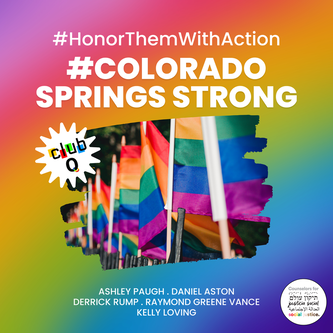 Check out our newest #CSJSpotlight - Emma Giordano, MHC-LP! Emma is from Long Island, New York. She works as a DBT therapist in Manhattan and is Marketing & Communications Officer of CSJ. Emma developed a deep passion for social justice issues through her love of books, inspired by the #WeNeedDiverseBooks movement which highlighted the need for marginalized authors and their stories in young adult literature. As a counseling student, her graduate program left an impact with it’s strong focus on serving clients from minoritized populations and social justice advocacy. She says, “I joined CSJ to utilize my skills in social media to promote the essential work of this organization and continue spreading awareness for social injustices that continue to plague our profession and the world as a whole.” Emma’s work for the CSJ Marketing & Communications committee involves designing flyers to promote CSJ-sponsored events, updating our website and social media accounts, collaborating with our blog writers to create social posts on social justice issues, and handling communication between CSJ members and committees. Her goals for CSJ include expanding our Marketing & Communications committee (which we are currently accepting new members for! Check out our recent post on how to join) and continuing to create engaging content that highlights the importance of justice, advocacy, and awareness. When Emma is not working for CSJ, you can find her, exploring New York City with friends, taking dance clases, devouring the next book from her favorite authors, and making YouTube videos sharing her thoughts on her recent reads. Give it up for Emma and the amazing work she is doing for CSJ’s online presence!
0 Comments
 In the month of November during a time of gratitude with loved ones, a tragic occurrence disrupted the LGBTQ community in Central Colorado. Currently, it appears many news platforms search for blame and motive of the perpetrator. There are even opportunities to see the good in our society by highlighting those that came to rescue. Other platforms unfortunately seek the opportunity to have discussions for political division. But small in number, are there conversations that explore how LGBTQIA+ communities & providers are held after horrific events such as this one. As a result, this piece will serve as a brief list of responses for those in the counseling field who support current survivors of violence in the LGBTQIA+ community. According to USA today, there have been 526 mass shootings since 2006 (USA Today, 2022). & yet, it is unclear how many of these shootings have been directed to queer communities and the possibility of those being underreported. Needless to say, we have an issue in US society. Until macro change is initiated in gun control and LGBTQIA+ protection, it is important clinicians, community organizers, researchers, and counselor educators remain creative & curious how to hold space for LGBTQIA+ communities. Here are some beginning steps to start this holding process below: Clinicians
In closing, below you will find additional resources those in the counseling field can use in support of LGBTQIA+ survivors of violence. Additional Resources
By Dr. Marcus D. Smith, PhD, LCPC References National Queer & Trans Therapist of Color Network. (2022, November 29). Radical Syllabus. NQTTCN. https://nqttcn.com/en/2021/05/03/radical-syllabus/ Smith. (2012). Decolonizing Methodologies : Research and Indigenous Peoples (2nd ed.). Zed Books. Tuck, E. and K.W. Yang. (2014b). ‘R-Words: Refusing Research’ in D. Paris and M. T. Winn (Eds.) Humanizing Research: Decolonizing Qualitative Inquiry with youth and Communities. Thousand Oakes, CA: Sage Publications. USA Today (2022, August 18). Mass killing database: Revealing trends, details and anguish of every US event since 2006. https://www.usatoday.com/in-depth/graphics/2022/08/18/mass-killings-database-us-events-since-2006/9705311002/ Wood, A., & Conley, A. (2014). Loss of religious or spiritual identities among the LGBT population. Counseling and Values, 59(1), 95-111. doi:10.1002/j.2161007X.2014.00044.x |
Archives
April 2024
Categories |
Home
Follow us on social media: @CSJNational
|
|
© COPYRIGHT 2023. ALL RIGHTS RESERVED | COUNSELORS FOR SOCIAL JUSTICE IS A DIVISION OF THE AMERICAN COUNSELING ASSOCIATION
DOCUMENTS AND IMAGES ARE COPYRIGHTED, ONLY TO BE USED WITH PERMISSION.
DOCUMENTS AND IMAGES ARE COPYRIGHTED, ONLY TO BE USED WITH PERMISSION.
 RSS Feed
RSS Feed
